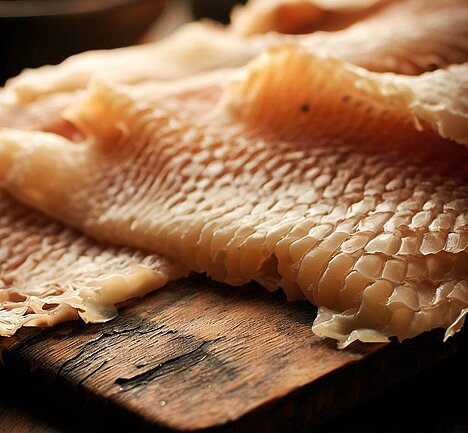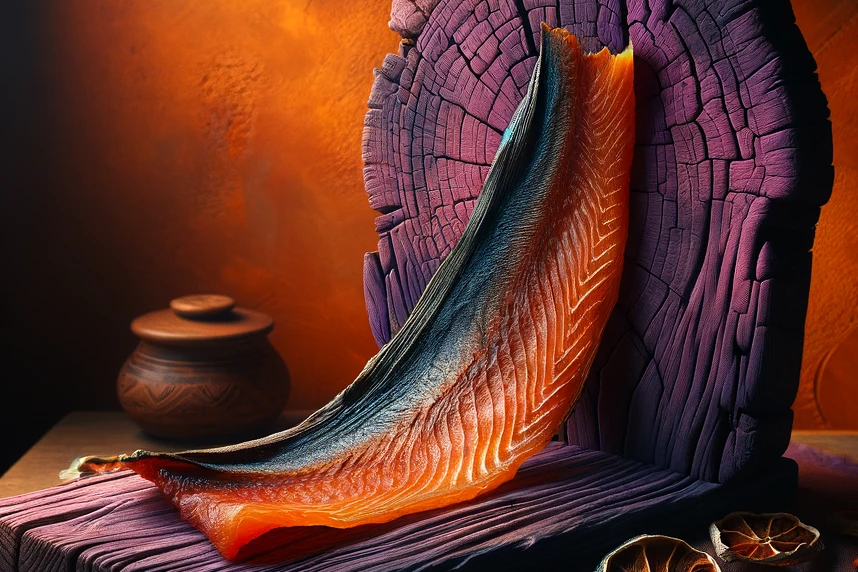Cod skins

Cod skins are a popular treat for dogs and are made from dried fish skins. They are rich in protein, omega-3 fatty acids and collagen and can promote the health of your dog's skin, coat, joints and teeth. But are cod skins safe for your four-legged friend? In this article, you can find out more about the advantages and disadvantages of cod skins and what you should look out for when buying and feeding them.
What are cod skins?
Cod skins are the skins of cod, a species of fish that is mainly found in the cold waters of the North Atlantic and the North Sea. After being caught, the skins are removed from the fish, washed, dried and cut into strips or sticks. Sometimes they are also smoked or seasoned with herbs and spices. Cod skins are available in many pet stores or online.
What are the benefits of cod skins for dogs?
Cod skins have several benefits for dogs in terms of both nutrition and well-being. Here are some of them:
- Protein: cod skins are made up of about 80 percent protein, which is important for muscle building, cell regeneration and the dog's immune system. Protein is also a good source of energy for active dogs.
- Omega-3 fatty acids: Cod meat contains large amounts of omega-3 fatty acids, which have an anti-inflammatory effect and can support your dog's heart health, brain function and vision. Omega-3 fatty acids can also alleviate skin problems such as itching, dandruff or eczema and make the coat shiny and supple.
- Collagen: Cod skins are a natural source of collagen, a structural protein responsible for the elasticity and strength of skin, hair, nails, bones and cartilage. Collagen can improve the health of your dog's joints and prevent or alleviate osteoarthritis. Collagen can also speed up the healing of wounds and slow down the ageing process.
- Tooth cleaning: Cod skins have a chewy consistency that has a mechanical cleaning effect on your dog's teeth when chewed. They can reduce tartar, massage the gums and freshen breath.
What are the disadvantages of cod skins for dogs?
Cod skins are not suitable for every dog and can also have some disadvantages or risks. Here are some of them:
- Allergies: some dogs may be allergic to fish or fish products. Symptoms of an allergy can include skin rash, itching, diarrhea or vomiting. If you suspect that your dog is allergic, you should take him to the vet immediately and stop giving him cod skins.
- Heavy metals:Fish can absorb heavy metals such as mercury or lead from the water, which accumulate in their organs or skin. These heavy metals can be toxic to your dog and lead to nerve damage or organ failure. To minimize the risk, you should only buy cod skins from controlled sources and not feed them too often.
- Ingestion: Cod skins can splinter when chewed or be too large for your dog. This can lead to choking or suffocation.
If you notice any signs of hypersensitivity or poisoning in your dog, you should see your vet immediately. We are not a substitute for a vet, but we try to be as accurate as possible. Every dog reacts differently and we recommend you get a second opinion or consult your vet if in doubt.
Stay healthy and take good care of your four-legged friend!😊
Similar to Cod skins
Salmon skin is exactly what it sounds like - the skin of the salmon. After the salmon has been processed for human consumption, the skin is often removed and can then be further processed to serve...
Cod skin has several benefits for dogs that you should know about: Cod skin is rich in protein, which is important for muscle building, wound healing and the immune system. Protein is also a...
Haddock skin is, simply put, the outer layer that covers the haddock. While haddock itself is known for its tasty flesh, its skin is often overlooked, even though it offers a number of nutritional...
Halibut skin is the outer layer that covers halibut, a large flatfish known for its white, firm flesh. The skin of this fish is thick and, similar to other fish species, can be eaten both raw and...



